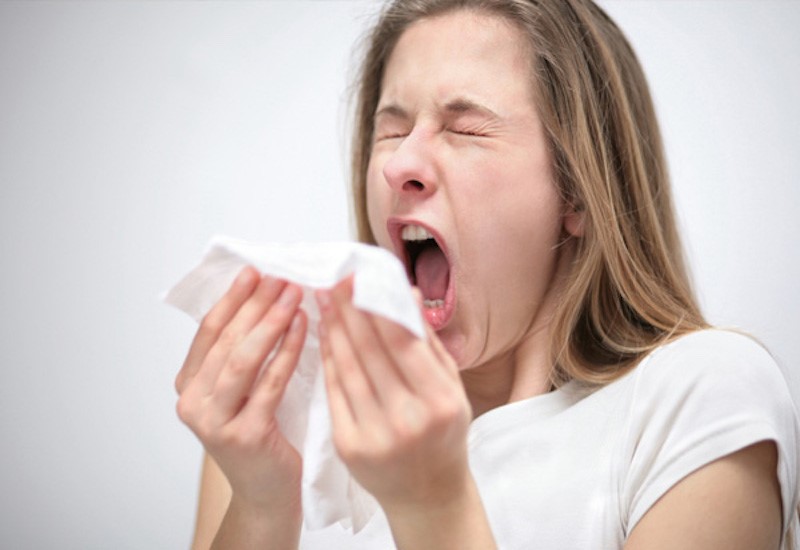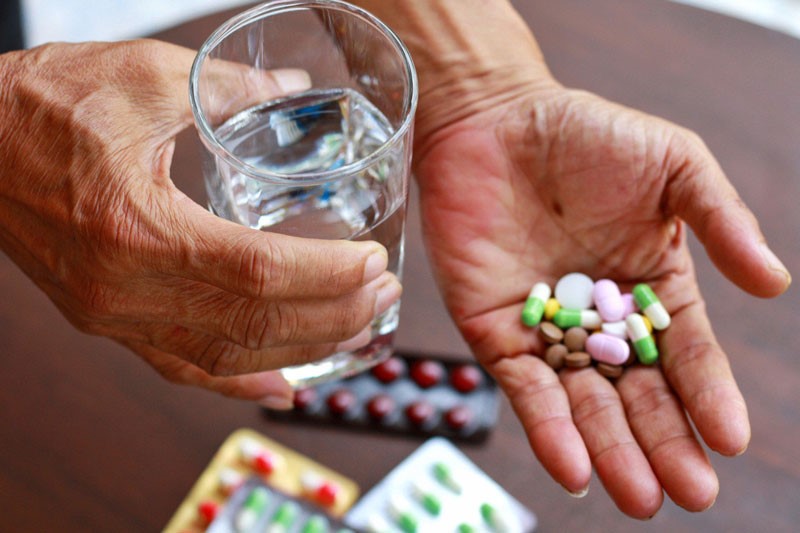1. Symptoms of allergic rhinitis
Typical symptoms of allergic rhinitis include:
- Itchy nose, sneezing: This is the most common and very unpleasant symptom. Itchy nose and sneezing occur when the weather changes suddenly, accompanied by muscle spasms or headaches with each sneeze; itching of the skin in the neck, eye area, throat, or outer ear canal.
- Runny nose, nasal congestion: When suffering from allergic rhinitis, the nasal mucosa becomes swollen and produces a lot of mucus, leading to nasal congestion and difficulty breathing. The nasal discharge is initially clear and watery, then gradually thickens. In cases of secondary infection, the nasal discharge will become cloudy and turn green or yellow. Difficulty breathing forces patients to breathe through their mouths, leading to dry mouth and throat. Nasal congestion causes nasal discharge to flow back up. This process leads to a cough reflex, sometimes even frequent coughing...
- Fatigue: Along with the above symptoms, patients often experience body aches and fatigue, and a feeling of lethargy.

Sneezing, runny nose, nasal congestion... are unpleasant symptoms of allergic rhinitis.
2. Medications for allergic rhinitis and precautions when using them.
Currently, there is no specific cure for allergic rhinitis; treatment mainly involves using medications to alleviate symptoms. Commonly used medications include:
- Nasal cleansing medication: Before using other medications, the first step is to cleanse the nose to keep it clear and reduce dryness and itching. 0.9% NaCl physiological saline solution is often recommended. 0.9% NaCl is available as nasal drops or sprays. It thins nasal mucus, allowing it to drain more easily and soothes the nasal mucosa.
0.9% NaCl solution is highly safe, causes few side effects, and can be used for pregnant women, newborns, and the elderly. For children, parents need to be careful when cleaning their noses to avoid applying too much force that could damage the nasal mucosa.
- Antihistamines: Histamine is a chemical produced by the body that leads to allergic reactions. When suffering from allergic rhinitis, histamine is released and stimulates symptoms such as runny nose, itchy eyes, sneezing, itchy nose, etc.
In the treatment of allergic rhinitis, first-generation H1 receptor antihistamines such as promethazine, chlorpheniramine, and diphenhydramine are often prescribed and are highly effective against allergies. However, these drugs have the disadvantage of potentially causing dry eyes, drowsiness, blurred vision, dry mouth, constipation, etc.
Second-generation antihistamines can overcome the aforementioned side effects and include loratadine, astemizole, fexofenadine, cetirizine, etc. Therefore, second-generation antihistamines are now more widely used than first-generation ones.
However, the effectiveness of each type depends on the specific case. Furthermore, antihistamines are more beneficial when used at the onset of an allergic reaction. If the allergic reaction has been ongoing for a long time, antihistamines will not be as effective.
- Nasal decongestants: Nasal congestion is the most unpleasant symptom of allergic rhinitis. Therefore, nasal decongestants are most commonly used by patients. Nasal decongestants are available in the form of nasal drops, sprays, or oral medications.
Some commonly used nasal sprays/drops, such as ephedrine, naphazoline, and oxymetazoline, work by constricting blood vessels in the nasal mucosa, reducing swelling and thus clearing the nasal passages and relieving congestion.
Because nasal decongestants provide quick relief and ease of breathing immediately after use, patients tend to overuse them. However, if nasal sprays/drops are used for more than 7 days or frequently, they can have adverse effects such as drug resistance, addiction, frequent relapses, and difficulty in achieving a complete cure due to scarring of the nasal mucosa.
Oral medications containing phenylpropanolamine work by constricting blood vessels, reducing mucosal swelling, and promoting drainage, thus quickly relieving nasal congestion. These medications should only be used after consulting a doctor. Common side effects include nervousness, tremors, urinary retention, and palpitations.
More serious reactions may include difficulty breathing, throat constriction, swelling of the lips, tongue/face, rash, seizures, hallucinations; irregular heartbeat, dizziness, headache, anxiety; restlessness, nausea, vomiting, sweating... If you experience any of these side effects, you should inform your doctor so that they can be treated promptly.

Use medication as directed by your doctor to achieve the best treatment results.
- Corticosteroids: These reduce inflammation and inhibit the release of cytokines, thus helping to alleviate symptoms of allergic rhinitis. Depending on the condition, corticosteroids can be used in nasal spray or oral form.
+ Corticosteroid nasal sprays: These sprays contain corticosteroids that quickly reduce inflammation of the nasal mucosa and improve the condition through an anti-inflammatory mechanism. Corticosteroid nasal sprays have fewer side effects than oral corticosteroids. They are recommended for the treatment of allergic rhinitis in children aged 2 years and older (depending on the type of medication).
However, patients should not overuse medication and should only use it as directed by their doctor.
Oral corticosteroids: These are less commonly used in the treatment of allergic rhinitis due to their numerous dangerous side effects. High doses of oral corticosteroids can cause osteoporosis, stomach ulcers, increased blood sugar levels, adrenal insufficiency, etc.
Doctors will weigh the risks and benefits before prescribing oral corticosteroids for patients with severe allergic rhinitis.
- Antibiotics: Only use when allergic rhinitis is complicated by bacterial infection. Recommended antibiotics include cephalosporins and penicillins. During treatment, patients must strictly adhere to the prescribed regimen to avoid antibiotic resistance and other complications.
Allergic rhinitis is not life-threatening, but it significantly impacts patients' quality of life. Proper medication, combined with a healthy diet and limiting exposure to risk factors, can help patients prevent recurrence.
Dr. Do Thi Dung
Source




![[Photo] Prime Minister Pham Minh Chinh attends the Conference on the Implementation of Tasks for 2026 of the Industry and Trade Sector](/_next/image?url=https%3A%2F%2Fvphoto.vietnam.vn%2Fthumb%2F1200x675%2Fvietnam%2Fresource%2FIMAGE%2F2025%2F12%2F19%2F1766159500458_ndo_br_shared31-jpg.webp&w=3840&q=75)




































































































Comment (0)